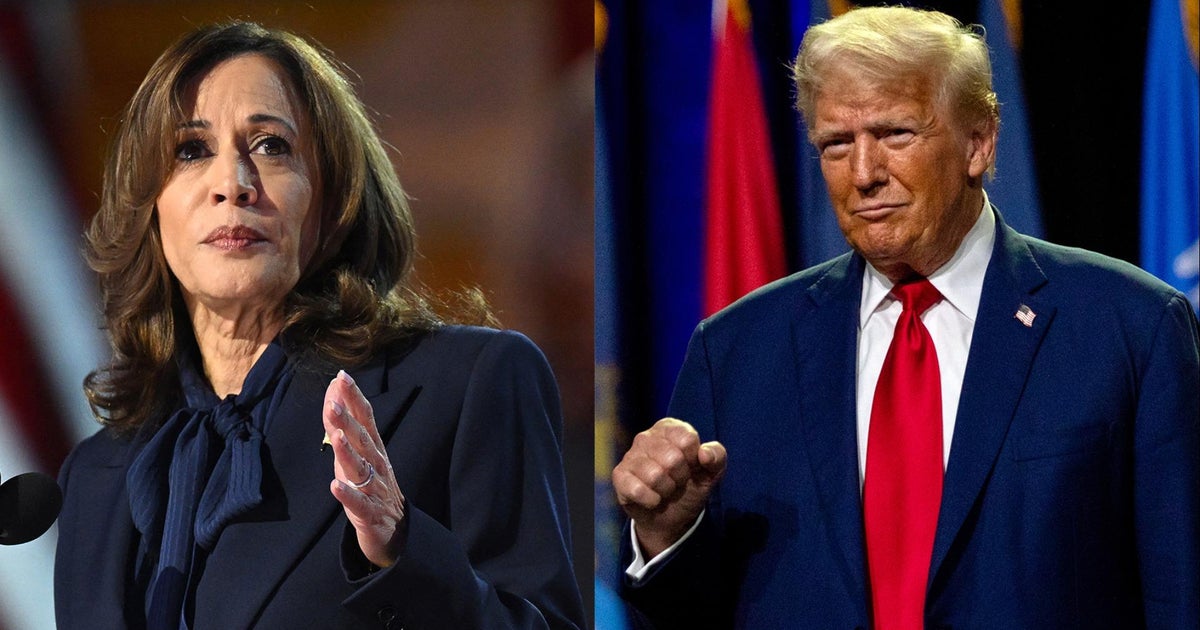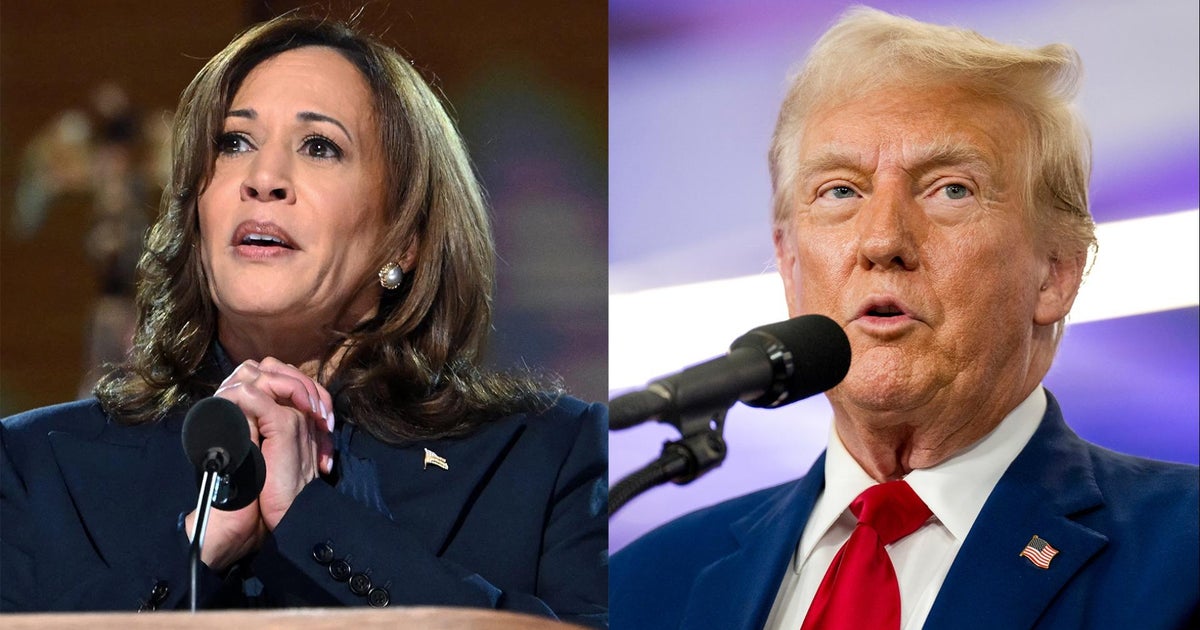As Election Day 2024 approaches, neither former President Donald Trump nor Vice President Kamala Harris have released their plans to address climate change or energy policy. Their campaign speeches, party platforms and track records in office provide some guidance for voters on what they might expect from a Harris or Trump administration.
The public record shows the two hold widely diverging views on climate. Trump has in the past called climate change a “hoax” and more recently, he told Elon Musk in an interview in August that the biggest threat to the world “is not global warming, where the ocean is going to rise one-eighth of an inch over the next 400 years.” (In fact, a 2022 report by the National Oceanic and Atmospheric Administration suggested that along U.S. coasts, sea levels could rise by two feet or more by 2100.)
The former president says increasing oil and gas production will make the U.S. the world’s top energy producer. “Drill, baby, drill,” he often says at campaign rallies.
Harris has talked about the threat of climate change and the damage to communities and families from more severe weather — floods, hurricanes and wildfires — “has been devastating.” “I have always believed, and I have worked on it, that the climate crisis is real,” she told CNN in an interview.
“Vice President Harris is focused on a future where all Americans have clean air, clean water, and affordable, reliable energy,” said Seth Schuster, a spokesperson for the Harris campaign.
As vice president, Harris has favored a shift to a “clean energy economy” while not completely backing away from oil and gas, as indicated by her recent comments on CNN that she would not ban frackingas president. She has tread lightly on the issue, careful not to alienate voters in key battleground states like Pennsylvania, one of the top natural gas producers in the country.
Here are where the two candidates stand on some of the key climate issues.
Donald Trump’s stance on climate change
Trump says he’ll roll back parts the Inflation Reduction Act, a sweeping set of proposals to expand clean energy passed under Biden. He has also taken aim at the Green New Deal, which he derides as the“Green New Scam.”
The Green New Deal is a non-bindingset of proposalsto tackle climate change introduced in 2019 by progressive Democrats Rep. Alexandria Ocasio-Cortez of New York and Sen. Edward J. Markey of Massachusetts. The resolution has not passed, but even if it did, nothing in it would carry the force of law.
On the oil and gas front, Trump has vowed to unlock new lands for drilling, expedite drilling permits and speed up approval of natural gas pipelines, among other initiatives. He has also indicated that he will restart liquified natural gas, or LNG, exports on his first day back in office, according to reporting by Politico.President Biden paused LNG exports in January, a move that was later blocked by a federal judge.
As president, Trump opened the Arctic National Wildlife Refuge to drilling through a $1.5 trillion tax bill. Environmental groups decried his actions, pointing to the threat drilling poses to Indigenous communities and the land that’shome to nearly 200 species.
While his public statements clearly indicate a preference for an economy powered by oil, gas and coal over renewable energy, Luke Bolar, chief external affairs officer of ClearPath Action, a right-learning clean energy group, said there were “a lot of wins for clean energy innovation,” during Trump’s first term citing the Advanced Reactor Demonstration Program, the Grid Storage Launchpad, expansions and extensions of the 45Q tax credit, and the Energy Act of 2020, a variety of initiatives intended to improve and expand electrification,carbon captureand nuclear energy.
If elected, Trump has promised to undo what he calls the “electric vehicle mandate” of the Biden administration on Day One in office, a move Trump campaign spokesperson Karoline Leavitt said “will save America’s auto industry and cut costs to reduce inflation and get our economy booming again.”
The Biden administration has not issued a mandate but has introducedincentivesto spur EV adoption, including a tax credit for those who meet income and eligibility requirements of up to $7,500 for new EVs and $4,000 for used EVs, and set a target that half of all new vehicle sales be zero emissions by 2030.
Trump has also signaled that he would drain funding from climate-focused agencies if he’s elected. In discussing budget cuts, hetold Fox News, “One of the things that’s so bad for us is environmental agencies. They make it impossible to do anything.”
As president, Trump proposed a26% budget cut to the EPAin 2020 and a31% cutin 2019, both of which were ultimately rejected by the Democrat-led House Appropriations Committee.
Project 2025, the Republican policy blueprint drafted by conservatives with ties to Trump, calls for the“restructuring and streamlining”of the Environmental Protection Agency. Trump has distanced himself from the Heritage Foundation-backed project, butCBS News’ analysisshows that among the 735 specific policy proposals outlined Project 2025, more than one-third are connected to Trump in some way.
Trump in 2017 announced the U.S. would pull out of the landmark Paris climate agreement, an accord signed by over 200 countries to set targets to reduce greenhouse gas emissions. The withdrawal process took three years to complete and was finalized the day after the election, on Nov. 4, 2020. On Mr. Biden’s first day as president, he signed an order to rejoin the agreement. Trump would exit the agreement again if elected.
Does Donald Trump have a climate change plan?
Trump has not released a comprehensive roadmap outlining proposed policies, but his team did share an outline of his energy plan with CBS News via email, some of which is detailed in the preceding section.
One of the more ambitious goals in the plan is to slash energy and electricity prices by “far more” than half. “Your energy bills will be down by 50%-70%,” a statement at the top from Trump reads. Experts whospoke with Axioscast doubt on this promise, explaining that his ability to alter global energy prices would be limited.
Outside of the energy plan, the Republican Party’s intentions for a Trump presidency can be gleaned from the official GOP platform.
Kamala Harris’ stance on climate change
Harris regularly touts the Inflation Reduction Act, which she casttie-breaking votefor. In her interview with CNN, she said she believes the climate crisis is an “urgent matter” and the nation should apply emissions metrics and adhere to specific deadlines.
“We did that with the Inflation Reduction Act,” she said. “We have set goals for the United States of America and by extension, the globe around when we should meet certain standards for reduction of greenhouse gas emissions as an example.”
As part of the Inflation Reduction Act, the Biden administration introduced tax credits in an effort to spur electric vehicle adoption.According to reporting byAxios, Harris has not made clear whether she supports her previous stance of making automakers build only electric or hydrogen vehicles by 2035. A spokesperson from her campaigntold the news sitethat Harris “does not support an electric vehicle mandate.” CBS News has asked the Harris campaign for more information and is awaiting a response.
Before taking on her role as vice president, Harris held big oil companies accountable through her position as California attorney general. In 2016, shelaunched an investigation into Exxon Mobilfor allegedly misleading the public and shareholders about climate risks. That same year, she alsopursued legal actionagainst Plains All-American Pipeline regarding a 2015 oil spill.
However, she’s not expected to completely pull the plug on America’s oil and gas production if elected president.
As a candidate in the Democratic primaries four years ago, Harris said during a CNN town hall that she was in favor of banning fracking, the process that involves injecting a solution of water and chemicals into rock formations to extract oil and natural gas.
But during a CNN interview on Aug. 29, she said, “as president, I will not ban fracking,” a statementindustry executives have quickly latched onto. Still, they remain skeptical about what her other energy initiatives will entail.
Oil and gas production reached record highs under the Biden administration. Mr. Biden approvedalmost 50% more gas and oil leasesduring his time in office than his Republican predecessor did during his first three years in office, according to reporting by Politico.
President Bidencanceled the oil and gas leasesin Alaska’s Arctic National Wildlife Refuge that were set in motion during Trump’s final days and instead proposed stronger protections for the 19-million-acre territory.
While she was a senator from California, Harris co-sponsored the Green New Deal, but in August,her campaign told CNNshe no longer supports the package of policy proposals.
Does Kamala Harris have a climate change plan?
Harris has not laid out a detailed energy and climate plan. The presidential candidate only briefly touched on her positions during theinterview with CNN’s Dana Bashon Aug. 29 and during herDemocratic National Convention speech in Chicago. Otherwise, her party’s platform offers more tangible examples as to how to she might address issues such as decarbonization and the fossil fuel industry.



